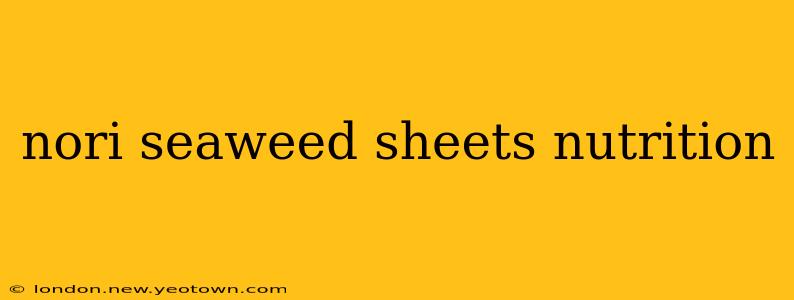Imagine this: you're enjoying a delicious sushi roll, the savory rice melding perfectly with the fresh fish and… that satisfyingly crisp, almost ethereal sheet of nori. But beyond its culinary magic, nori seaweed sheets pack a serious nutritional punch. Often overlooked as a mere wrapping, nori is a nutritional powerhouse, brimming with vitamins, minerals, and beneficial compounds. Let's dive into the fascinating world of nori nutrition.
What are the Nutritional Benefits of Nori Seaweed Sheets?
Nori is a type of edible seaweed, and its nutritional profile is remarkably impressive. A single sheet of nori (around 3 grams) is a low-calorie, high-nutrient food offering a wealth of vitamins and minerals essential for overall health. It's particularly rich in:
- Protein: Providing a small but significant amount of protein, nori contributes to building and repairing tissues.
- Fiber: Excellent for digestive health, the fiber in nori aids in regularity and promotes gut microbiome balance.
- Vitamins: Nori is a good source of Vitamin A (in the form of beta-carotene), Vitamin B12 (crucial for vegetarians and vegans), Vitamin C, and Vitamin K.
- Minerals: It’s a treasure trove of minerals including iron, calcium, iodine, magnesium, and potassium – all vital for various bodily functions.
What are the Different Types of Nori Seaweed Sheets?
While most people are familiar with the dark, almost black sheets used in sushi, there’s more to nori than meets the eye. Nori is typically categorized by its color, which is influenced by the time of year it's harvested and processing methods. These variations don't drastically affect the nutritional content, but they can impact the flavor and texture. You might encounter:
- Darker Nori: Often considered the most flavorful and preferred for sushi.
- Lighter Nori: Can have a milder taste and be slightly softer in texture.
While the nutritional differences are minimal, the slight variations in taste and texture can affect your culinary preferences.
How Many Calories are in a Nori Seaweed Sheet?
A single sheet of nori boasts an incredibly low calorie count—typically around 20 calories. This makes it an ideal ingredient for weight management and those looking to maintain a healthy diet. Its low-calorie nature doesn't compromise its nutritional value, making it a true nutritional champion.
Is Nori Seaweed Good for Weight Loss?
The low-calorie and high-fiber content of nori contribute to its potential weight-loss benefits. Fiber promotes satiety, keeping you feeling full for longer and reducing overall calorie intake. Including nori in a balanced diet can be a helpful tool in managing weight. However, it's crucial to remember that weight loss is a multifaceted process involving a holistic approach encompassing diet, exercise, and overall lifestyle changes.
What are the Potential Side Effects of Eating Too Much Nori?
While nori offers remarkable nutritional benefits, excessive consumption can lead to some side effects. Because nori is rich in iodine, consuming excessive amounts can lead to iodine overload, potentially resulting in thyroid issues. Moderation is key – enjoy nori as part of a balanced diet, rather than as a primary food source. Additionally, some individuals might experience digestive discomfort such as bloating if they consume too much in a single sitting.
Is Nori Seaweed Safe for Pregnant Women?
Pregnancy requires a balanced diet rich in essential nutrients. Nori can contribute to this, offering valuable vitamins and minerals. However, pregnant women should consume nori in moderation due to its iodine content. Consulting a healthcare professional is always recommended to address specific dietary needs and concerns during pregnancy.
Nori seaweed sheets offer an incredible nutritional profile, providing a variety of essential vitamins and minerals in a low-calorie package. Incorporating nori into your diet can contribute to improved health and wellbeing. Remember, moderation and a balanced diet are key to reaping the benefits of this nutritional gem.

